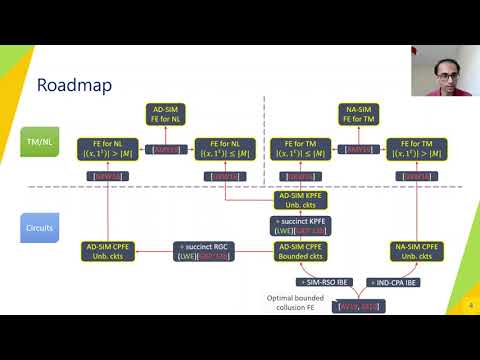Welcome to the resource topic for 2021/848
Title:
Functional Encryption for Turing Machines with Dynamic Bounded Collusion from LWE
Authors: Shweta Agrawal, Monosij Maitra, Narasimha Sai Vempati, Shota Yamada
Abstract:The classic work of Gorbunov, Vaikuntanathan and Wee (CRYPTO 2012) and follow-ups provided constructions of bounded collusion Functional Encryption (FE) for circuits from mild assumptions. In this work, we improve the state of affairs for bounded collusion FE in several ways: 1. New Security Notion. We introduce the notion of dynamic bounded collusion FE, where the declaration of collusion bound is delayed to the time of encryption. This enables the encryptor to dynamically choose the collusion bound for different ciphertexts depending on their individual level of sensitivity. Hence, the ciphertext size grows linearly with its own collusion bound and the public key size is independent of collusion bound. In contrast, all prior constructions have public key and ciphertext size that grow at least linearly with a fixed bound Q. 2. CPFE for circuits with Dynamic Bounded Collusion. We provide the first CPFE schemes for circuits enjoying dynamic bounded collusion security. By assuming identity based encryption (IBE), we construct CPFE for circuits of unbounded size satisfying non-adaptive simulation based security. By strengthening the underlying assumption to IBE with receiver selective opening security, we obtain CPFE for circuits of bounded size, output length and depth enjoying adaptive simulation based security. Moreover, we show that IBE is a necessary assumption for these primitives. Moreover, by relying on the Learning With Errors (LWE) assumption, we obtain the first succinct CPFE for circuits, i.e. supporting circuits with unbounded size, but fixed output length and depth. This scheme achieves adaptive simulation based security. 3. KPFE for circuits with dynamic bounded collusion. We provide the first KPFE for circuits of unbounded size, but bounded depth and output length satisfying dynamic bounded collusion security. Our construction relies on LWE and achieves adaptive simulation based security. This improves the security of succinct KPFE by Goldwasser et al. [GKPVZ13b]. 4. KP and CP FE for TM/NL with dynamic bounded collusion. We provide the first KPFE and CPFE constructions of bounded collusion functional encryption for Turing machines in the public key setting from LWE. Our constructions achieve non-adaptive simulation based security. Both the input and the machine in our construction can be of unbounded polynomial length but the ciphertext size grows with the upper bound on the running time of the Turing machine on the given input. Given RAM access to the ciphertext, the scheme enjoys input specific decryption time. We provide a variant of the above scheme that satisfies adaptive security, but at the cost of supporting a smaller class of computation, namely Nondeterministic Logarithmic-space (NL). Since NL contains Nondeterministic Finite Automata (NFA), this result subsumes all prior work of bounded collusion FE for uniform models from standard assumptions [AMY19,AS17].
ePrint: https://eprint.iacr.org/2021/848
Talk: https://www.youtube.com/watch?v=ytoLoaixXqQ
Slides: https://iacr.org/submit/files/slides/2021/crypto/crypto2021/271/slides.pdf
See all topics related to this paper.
Feel free to post resources that are related to this paper below.
Example resources include: implementations, explanation materials, talks, slides, links to previous discussions on other websites.
For more information, see the rules for Resource Topics .
